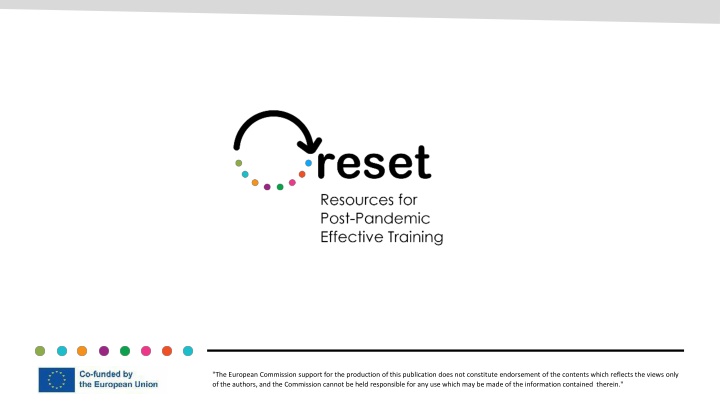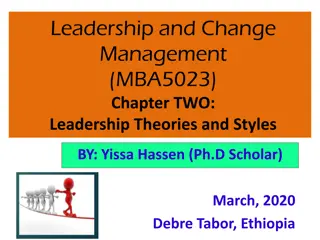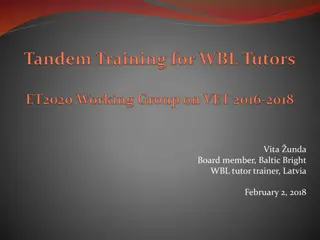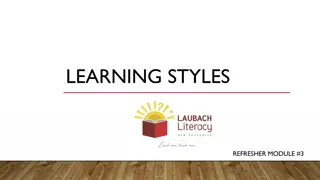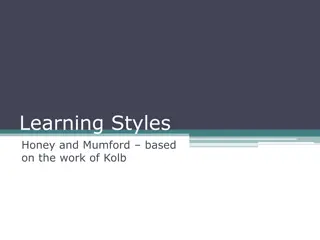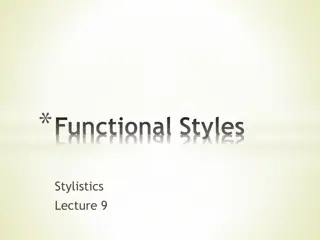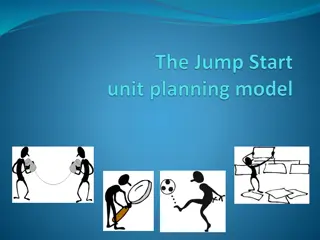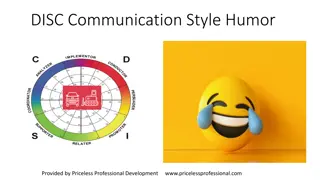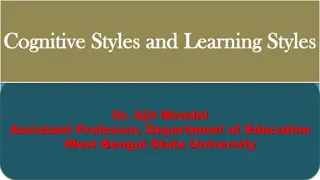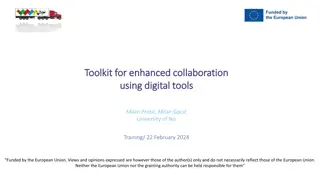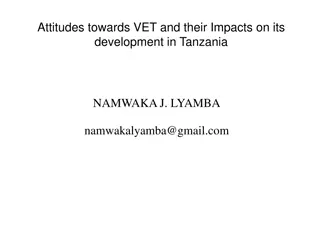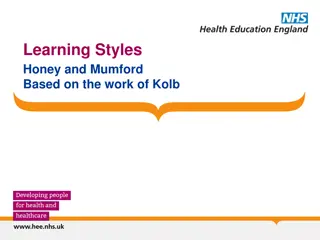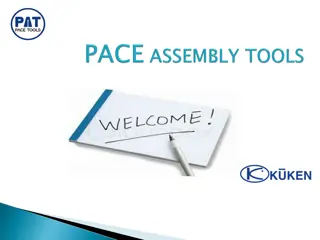Optimizing Digital VET: Learning Styles and Tools
Learning styles play a crucial role in digital education. This publication delves into how digital tools can cater to different learner preferences, enhancing comprehension and retention. It emphasizes the significance of considering individual learning styles when designing effective teaching methodologies with the aid of technology.
Download Presentation

Please find below an Image/Link to download the presentation.
The content on the website is provided AS IS for your information and personal use only. It may not be sold, licensed, or shared on other websites without obtaining consent from the author.If you encounter any issues during the download, it is possible that the publisher has removed the file from their server.
You are allowed to download the files provided on this website for personal or commercial use, subject to the condition that they are used lawfully. All files are the property of their respective owners.
The content on the website is provided AS IS for your information and personal use only. It may not be sold, licensed, or shared on other websites without obtaining consent from the author.
E N D
Presentation Transcript
"The European Commission support for the production of this publication does not constitute endorsement of the contents which reflects the views only of the authors, and the Commission cannot be held responsible for any use which may be made of the information contained therein."
Optimizing digital VET - Digital tools and resources Learning styles and Roles Partner: Aalborg Handelsskole "The European Commission support for the production of this publication does not constitute endorsement of the contents which reflects the views only of the authors, and the Commission cannot be held responsible for any use which may be made of the information contained therein."
Goals At the end of this module you will be able to: Facilitating and roles Understand the meaning of facilitating and roles Learning styles Know the four core learning styles "The European Commission support for the production of this publication does not constitute endorsement of the contents which reflects the views only of the authors, and the Commission cannot be held responsible for any use which may be made of the information contained therein."
Index of contents 1. Learning styles 2. Facilitating and roles 2.1: Digital learning facilitator 2.2: The roles of a digital learning facilitator 1.1: Learning styles and digital tools 1.2: The four core learning styles "The European Commission support for the production of this publication does not constitute endorsement of the contents which reflects the views only of the authors, and the Commission cannot be held responsible for any use which may be made of the information contained therein."
Learning styles 1.1 Learning styles and digital tools Who are the learners? Learning styles refer to the ways in which people prefer to learn new information and concepts. - The use of digital tools in teaching should take students' differences into account, when planning learning methodologies. How Education Technology Works for Every Learning Style Technology is a tool teachers can use to help students learn. It gives each student a way to learn that is the best for them. Teachers can pick what would work well in the classroom by trying different tools like PowerPoint, video, quizzes, apps, smartphones, digitally mediated exercises, etc. "The European Commission support for the production of this publication does not constitute endorsement of the contents which reflects the views only of the authors, and the Commission cannot be held responsible for any use which may be made of the information contained therein."
Learning styles 1.2 The four core learning styles Auditory Learn best by hearing information Visual Learn best by seeing information 1 1 2 2 3 3 4 4 Kinesthetic Reading/writing Learn best by reading and writing information Learn best by hands-on experiences "The European Commission support for the production of this publication does not constitute endorsement of the contents which reflects the views only of the authors, and the Commission cannot be held responsible for any use which may be made of the information contained therein."
Learning styles 1.2 The four core learning styles Visual learners Show instead of tell Visual learners learn better when they see pictures. The pictorial representation of information (such as arrows and charts) allows visual learners to recall the information more accurately. Digital tools and activities that support visual learning Youtube, take photos with smartphone, gps guided tours, 3d software, Virtual Reality, screenrecording, mindmaps, visual elements such as games and simulations etc. "The European Commission support for the production of this publication does not constitute endorsement of the contents which reflects the views only of the authors, and the Commission cannot be held responsible for any use which may be made of the information contained therein."
Learning styles 1.2 The four core learning styles Auditory learners Some people learn best if they listen Aural learners, learn best by hearing information and speaking their answers. They often prefer listening to lectures and engaging with audio content rather than taking notes. Digital tools and activities that support auditory learning Audio recordings of lectures, podcast creation, audio books, record homework onto devices, online collaboration tools that allow students to engage in real-time discussions. "The European Commission support for the production of this publication does not constitute endorsement of the contents which reflects the views only of the authors, and the Commission cannot be held responsible for any use which may be made of the information contained therein."
Learning styles 1.2 The four core learning styles Reading/writing learners Learn best by reading and taking notes Read/write learners learn primarily by reading and writing. They prefer to learn information by reading notes, handouts and textbooks. These learners make use of dictionaries and other reference materials. Digital tools and activities that support Reading/writing learning E-books, digital dictionaries, thesauruses, and other language learning tools, dicational software that includes writing and editing tools, such as spell checkers and grammar checkers, Using online collaboration tools to allow students to share their writing with each other and receive feedback. "The European Commission support for the production of this publication does not constitute endorsement of the contents which reflects the views only of the authors, and the Commission cannot be held responsible for any use which may be made of the information contained therein."
Learning styles 1.2 The four core learning styles Kinesthetic learner Hands-on learners Kinesthetic learners are hands-on learners. They thrive when they can engage all of their senses during course work. In workshops and labs, these students work well because they are given the opportunity to engage with their hands and all of their senses. Digital tools and activities that support Kinesthetic learning Record video when doing things(vlogging), assignments with real-life connections, quizzes with Branching scenarios, virtual field trips, VR, interactive tools to allow students to move, manipulate, and explore information. "The European Commission support for the production of this publication does not constitute endorsement of the contents which reflects the views only of the authors, and the Commission cannot be held responsible for any use which may be made of the information contained therein."
Learning styles 1.2 The four core learning styles Multimodal learning Multimodal learning Apply multiple learning styles simultaneously. Digital tools Students who are exposed to multiple learning styles can learn the material quicker and have a deeper understanding of what was taught within the learning process this can be facilitated with digital tools "The European Commission support for the production of this publication does not constitute endorsement of the contents which reflects the views only of the authors, and the Commission cannot be held responsible for any use which may be made of the information contained therein."
Learning Styles Please answer the following questions: What are learning styles? Ways in which people prefer to learn new information and concepts. Ways in which teachers prefer to teach new information and concepts. C) Ways in which digital tools can replace traditional learning methods. D) Ways in which students can avoid learning new information and concepts What are the four core learning styles? Verbal, logical, physical, social Visual, auditory, reading/writing, kinesthetic Memory, cognitive, affective, behavioral Which of the following statements is true about learning styles and digital tools? There is no correlation between learning styles and the use of digital tools Students who have a single learning style should not use digital tools Digital tools can be used to facilitate multimodal learning Digital tools are only useful for visual learners Which type of learner prefers to learn by seeing information? Visual learners Auditory learners Reading/writing learners Kinesthetic learners "The European Commission support for the production of this publication does not constitute endorsement of the contents which reflects the views only of the authors, and the Commission cannot be held responsible for any use which may be made of the information contained therein."
Learning Styles Here are the answers: What are learning styles? Ways in which people prefer to learn new information and concepts. Ways in which teachers prefer to teach new information and concepts. C) Ways in which digital tools can replace traditional learning methods. D) Ways in which students can avoid learning new information and concepts What are the four core learning styles? Verbal, logical, physical, social Visual, auditory, reading/writing, kinesthetic Memory, cognitive, affective, behavioral Which of the following statements is true about learning styles and digital tools? There is no correlation between learning styles and the use of digital tools Students who have a single learning style should not use digital tools Digital tools can be used to facilitate multimodal learning Digital tools are only useful for visual learners Which type of learner prefers to learn by seeing information? Visual learners Auditory learners Reading/writing learners Kinesthetic learners "The European Commission support for the production of this publication does not constitute endorsement of the contents which reflects the views only of the authors, and the Commission cannot be held responsible for any use which may be made of the information contained therein."
Facilitating and roles 2.1 Digital learning facilitator Digital learning facilitator A digital learning facilitator is a person who helps facilitate learning using digital tools and technology. This may involve creating and implementing lesson plans, providing support and guidance to students, and using various types of technology, such as computers, tablets, and other digital devices, to enhance the learning experience. A digital learning facilitator may work in a variety of educational settings, including schools, universities, and online learning platforms Traditional learning facilitator A traditional learning facilitator, without digital tools, has a daily life where frameworks, rules and traditions are part of the daily culture of the institution. Both teachers and students know how to behave in the familiar environment and everyone knows their role. -The digitisation of education brings change, and with it a change of roles. "The European Commission support for the production of this publication does not constitute endorsement of the contents which reflects the views only of the authors, and the Commission cannot be held responsible for any use which may be made of the information contained therein."
Facilitating and roles 2.2 The roles of a digital learning facilitator A social role Facilitates the building Pedagogical role support students in their learning and to help them achieve the learning objectives of learning communities. 1 1 2 2 3 3 4 4 Technical role Learn best by hands-on experiences Managerial Role Communicating the course organisation and course flow. 15 "The European Commission support for the production of this publication does not constitute endorsement of the contents which reflects the views only of the authors, and the Commission cannot be held responsible for any use which may be made of the information contained therein."
Facilitating and roles 2.2 The roles of a digital learning facilitator Pedagogical role Pedagogical role The pedagogical role refers to the role of the teacher or educator in designing, implementing, and evaluating educational experiences for learners This includes creating lesson plans and other instructional materials, selecting and using appropriate teaching methods and technologies, and assessing student learning and progress "The European Commission support for the production of this publication does not constitute endorsement of the contents which reflects the views only of the authors, and the Commission cannot be held responsible for any use which may be made of the information contained therein."
Facilitating and roles 2.2 The roles of a digital learning facilitator Managerial Role Managerial Role The teacher's digital managerial role refers to the way in which they use digital tools and resources to manage and organize their teaching and learning activities. This can include using digital tools to create and deliver lessons and instructional materials, to communicate with students and parents, to track student progress In a digital managerial role, teachers may also be responsible for integrating digital tools and resources into their teaching practice, and for adapting their teaching methods to take advantage of the unique capabilities of digital technology "The European Commission support for the production of this publication does not constitute endorsement of the contents which reflects the views only of the authors, and the Commission cannot be held responsible for any use which may be made of the information contained therein."
Facilitating and roles 2.2 The roles of a digital learning facilitator Social role Social role In the digital age, the teacher's social role may also include helping students to develop appropriate social behaviors and attitudes in online and digital environments. In a digital social role, teachers may also be responsible for creating and maintaining a positive and inclusive online classroom community, and for providing support and guidance to students as they navigate digital learning environments. "The European Commission support for the production of this publication does not constitute endorsement of the contents which reflects the views only of the authors, and the Commission cannot be held responsible for any use which may be made of the information contained therein."
Facilitating and roles 2.2 The roles of a digital learning facilitator Technical role Technical role The teacher's digital technical role refers to their role in using and supporting the use of digital tools and resources in the classroom. This can involve helping students to use various digital tools and resources, troubleshooting technical issues that may arise, and providing support and guidance to students as they work with technology. teachers in a digital technical role may be responsible for training students and other teachers on the use of digital tools and resources, and for providing support and guidance as needed. They may also be responsible for staying up-to-date with the latest trends and developments in educational technology "The European Commission support for the production of this publication does not constitute endorsement of the contents which reflects the views only of the authors, and the Commission cannot be held responsible for any use which may be made of the information contained therein."
Facilitating and roles Summing up: Digital learning facilitator Person who helps facilitate learning using digital Traditional learning facilitator Daily life where frameworks, rules and traditions are part of the daily culture of the institution Change of roles The digitization of education brings change, and with it a change of roles. Roles of a digital learning facilitator Pedagogical, Managerial, Social, Technical. "The European Commission support for the production of this publication does not constitute endorsement of the contents which reflects the views only of the authors, and the Commission cannot be held responsible for any use which may be made of the information contained therein."
Facilitating and roles Please answer the following questions: What is a Digital learning facilitator? A webmaster for a digital platform. Facilitator of learning using digital tools A teacher who plans the introduction of a new learning platform What does the pedagogical role involve? Creating lesson plans and other instructional materials The role of the student in participating in educational experiences Maintainer of server database Participating in professional development activities What does the Technical role involve? Maintaining and updating the digital infrastructure Support the use of digital tools Participating in professional development activities Participating in professional development activities What does the Managerial Role involve? Organize digital teaching and learning activities Maintaining and updating the digital infrastructure Read-write emails Publish video on a digital platform "The European Commission support for the production of this publication does not constitute endorsement of the contents which reflects the views only of the authors, and the Commission cannot be held responsible for any use which may be made of the information contained therein."
Facilitating and roles Answers: What is a Digital learning facilitator? A webmaster for a digital platform. Facilitator of learning using digital tools A teacher who plans the introduction of a new learning platform What does the pedagogical role involve? Creating lesson plans and other instructional materials The role of the student in participating in educational experiences Maintainer of server database Participating in professional development activities What does the Technical role involve? Maintaining and updating the digital infrastructure Support the use of digital tools among students Participating in professional development activities Participating in professional development activities What does the Managerial Role involve? Organize digital teaching and learning activities Maintaining and updating the digital infrastructure Read-write emails Publish video on a digital platform "The European Commission support for the production of this publication does not constitute endorsement of the contents which reflects the views only of the authors, and the Commission cannot be held responsible for any use which may be made of the information contained therein."
Final summary test Consolidate your knowledge answering the following questions: What is a Digital learning facilitator? A webmaster for a digital platform. Facilitator of learning using digital tools A teacher who plans the introduction of a new learning platform What does the pedagogical role involve? Creating lesson plans and other instructional materials The role of the student in participating in educational experiences Maintainer of server database Participating in professional development activities "The European Commission support for the production of this publication does not constitute endorsement of the contents which reflects the views only of the authors, and the Commission cannot be held responsible for any use which may be made of the information contained therein."
Final summary test solutions Here are the answers: What is a Digital learning facilitator? A webmaster for a digital platform. Facilitator of learning using digital tools A teacher who plans the introduction of a new learning platform What does the pedagogical role involve? Creating lesson plans and other instructional materials The role of the student in participating in educational experiences Maintainer of server database Participating in professional development activities "The European Commission support for the production of this publication does not constitute endorsement of the contents which reflects the views only of the authors, and the Commission cannot be held responsible for any use which may be made of the information contained therein."
Awsome! Remember (now you know): Facilitating and roles Understand the meaning of facilitating and roles Learning styles Know the four core learning styles "The European Commission support for the production of this publication does not constitute endorsement of the contents which reflects the views only of the authors, and the Commission cannot be held responsible for any use which may be made of the information contained therein."
Keep going! project-reset.eu "The European Commission support for the production of this publication does not constitute endorsement of the contents which reflects the views only of the authors, and the Commission cannot be held responsible for any use which may be made of the information contained therein."
